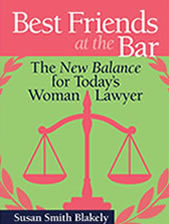Many women were raised to speak only when spoken to. Maybe you heard that from your mother or your grandmother. That might have been fine in days gone by, but it has no relevance in today’s world. Today, women need to learn to speak up and be heard, and that certainly is true of women in a male-dominated profession like law.
It is not sufficient to wait until someone invites your opinion or comment. You should not be reluctant to express yourself without an invitation as long as you have something relevant to say that will be an asset to the discussion — or at least that YOU think will be an asset to the discussion.
These concerns about women professions being marginalized are not confined to law practice in America, as evidenced by this article from the UK. Although the article was spurred by the #Metoo movement and its headline effect around the world, the author points out that “it’s the gradual accumulation of the relentless tiny trickles that will wear down the walls of inequality and produce lasting changes.” I like that. Well said. So, how do you become relentless?
The suggestions about making your voice heard in this article are simple yet practical and helpful. They range from having the courage to acknowledge a lack of knowledge to having a game plan to gain more confidence in speaking. In the end, they are all about building confidence and building your brand.
Here is a summary of the “4 Ways to Speak Up” — with my own twist on it, as usual:
- Set Speaking Goals for Yourself: Examples range from saying at least one thing during a meeting to having at least one comment on a draft document to offering to present something of value to your team once a month;
- Prepare Yourself to Add Value: Doing your homework on what will be discussed is the surest way to having the confidence to speak up. This is an easy one. All it takes is preparation;
- Speak Up by Speaking Strong: Eliminate words of weakness from your vocabulary. Get rid of phrases like “This may not be correct, but …”, “I don’t know as much about this as you do”, and even “I’m just wondering if … .” These words make you sound less confident about what you are saying, and saying them will not make what you are saying more right or more relevant. If you are wrong, you will be wrong with or without the protective weak words. In fact, it is better to be wrong and assertive than to be wrong and weak;
- Politely Refuse to be Interrupted: Especially in a male-dominated environment, men always seem to be interrupting women. The perception is that what they have to say is more important — and they are men and entitled to take and keep the stage. It is especially difficult to refuse to be interrupted when the interrupter is a senior partner or some other person in a position of power, so it can be a real challenge. The words you use to assure that you can continue your thought and finish your remarks depend on YOU, your personality and typical demeanor, and what is within your comfort zone. In all cases, however, be polite and gracious and smile when you are standing your ground. This is no time for your best impression of a b****. That will set you back rather than more you forward.
Why is this so important? Because your supervisors are watching, and so is the client. Because your colleagues are watching and learning from you. This is your chance to demonstrate your interest in your work and your potential to be a valuable member of the team and a leader in your firm or organization. Don’t let the opportunities get away.
Speak up!












